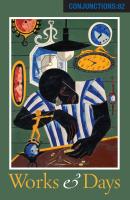![Photograph © 2018 Nancy Crampton Photograph © 2018 Nancy Crampton [A Reading by Sigrid Nunez]](http://www.conjunctions.com/images/event_image.php?id=136227) On Monday, November 11, at 6:30 p.m., in the László Z. Bitó ’60 Auditorium, Reem-Kayden Center (RKC), Sigrid Nunez reads from her work. Presented by the Innovative Contemporary Fiction Reading Series and the Written Arts Program, and introduced by MacArthur Fellow Dinaw Mengestu, the reading is free and open to the public; no tickets or reservations are required. Books by Sigrid Nunez will be available for sale, courtesy of Oblong Books & Music.
On Monday, November 11, at 6:30 p.m., in the László Z. Bitó ’60 Auditorium, Reem-Kayden Center (RKC), Sigrid Nunez reads from her work. Presented by the Innovative Contemporary Fiction Reading Series and the Written Arts Program, and introduced by MacArthur Fellow Dinaw Mengestu, the reading is free and open to the public; no tickets or reservations are required. Books by Sigrid Nunez will be available for sale, courtesy of Oblong Books & Music.Sigrid Nunez was born and raised in New York City, the daughter of a German mother and a Panamanian-Chinese father. In 1972, after graduating from Barnard College, Nunez worked as an editorial assistant for Robert B. Silvers at the New York Review of Books. She then received her MFA from Columbia University and returned to NYRB, where she met the late Susan Sontag, who became the subject of her 2011 memoir, Sempre Susan. Nunez chronicled her childhood and adolescence in her first book, a hybrid novel, A Feather on the Breath of God (1995), both a critical and commercial success. Her novel For Rouenna (2001), which tells the story of a woman’s experiences in the Vietnam War, was seen by many as her “breakthrough work.” In her fiction, Nunez has experimented with a vast range of genres and themes, marked by a spare, intimate, confessional tone. While beloved by fellow novelists, Nunez kept a deliberate distance from the literary scene, but with the 2018 publication of “The Friend,” Nunez became an “overnight literary sensation,” winning the 2018 National Book Award for Fiction and drawing euphoric reviews that hailed the novel as “a subtle, unassuming masterpiece” (New York Times).
Sigrid Nunez is the author of eight books. Her work has appeared in anthologies including four Pushcart Prize volumes, four anthologies of Asian-American literature, and The Best American Short Stories 2019. She is the recipient of a Whiting Writer’s Award, a Berlin Prize Fellowship, and two awards from the American Academy of Arts and Letters: the Rosenthal Foundation Award and the Rome Prize in Literature. Her work has been translated into ten languages and is in the process of being translated into thirteen more. She lives in New York City.
PRAISE FOR SIGRID NUNEZ
“Nunez’s prose itself comforts us. Her confident and direct style uplifts—the music in her sentences, her deep and varied intelligence. She addresses important ideas unpretentiously and offers wisdom for any aspiring writer.” —New York Times Book Review
“Nunez has proved herself a master of psychological acuity.” —New Yorker
“A major talent . . . [Nunez’s] gift is wild and large.” —San Francisco Chronicle
“Nunez’s piercing intelligence and post-feminist consciousness may well feel that writing the Great American novel is no longer a feasible or worthwhile goal—but damned if she hasn’t gone and done it anyway.” —Salon
“Nunez’s keen powers of observation make her a natural chronicler.” —New York Review of Books
“When the apocalypse comes, I want Nunez in my lifeboat.” —Vanity Fair
“One of the most dizzyingly accomplished of our writers.” —Gary Shteyngart
